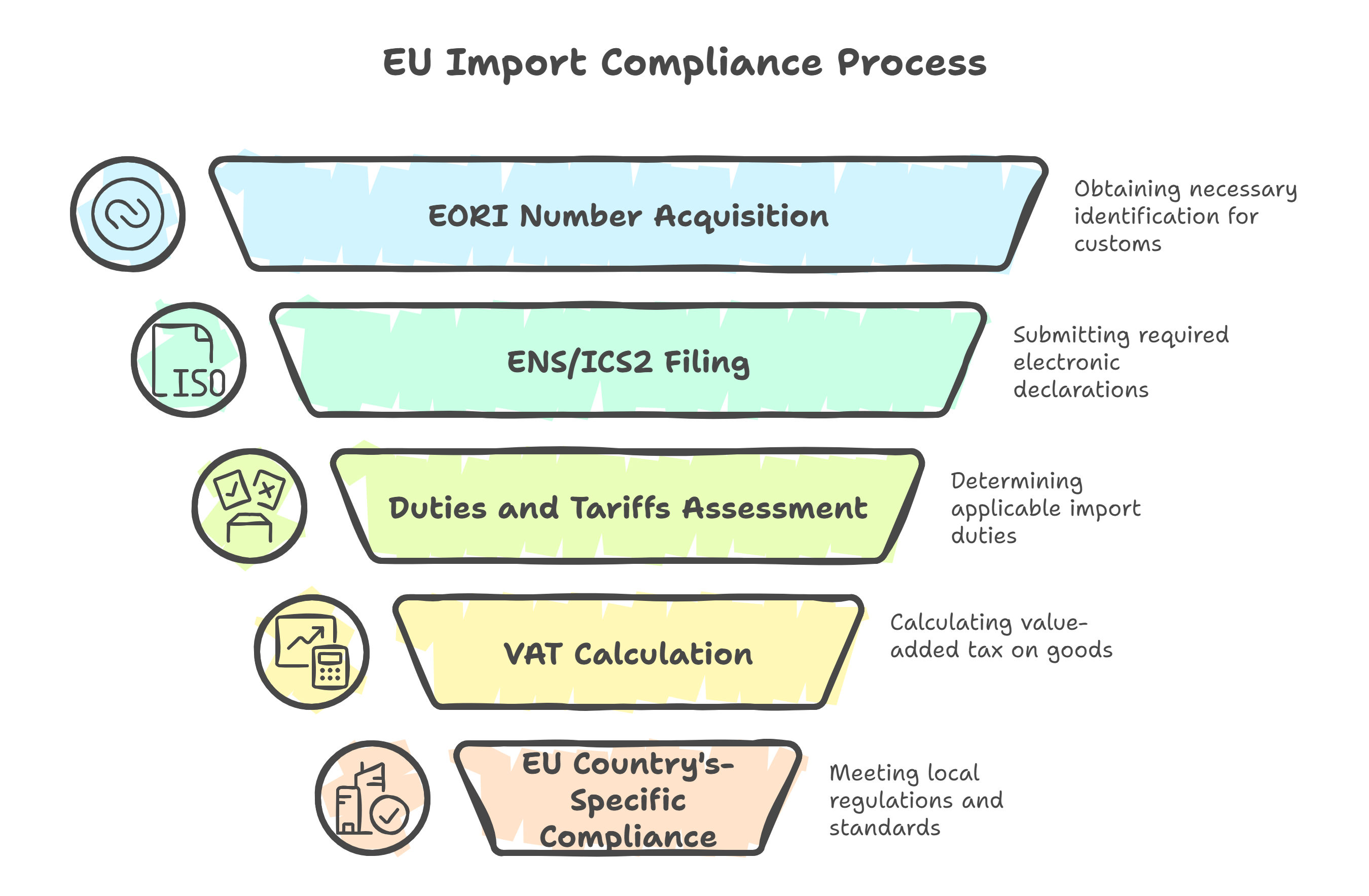|
|
Less-than-Container-Load | Affordable International Shipping | 7-Step Guide
Shipping Goods to Ireland from the USA
Ireland Import Regulations: A Complete Guide for U.S. Shippers
Ireland is a friendly and accessible destination for both U.S. commercial exports and personal shipments. As a member of the European Union (EU), Ireland adheres to EU customs law, which means shipments are subject to standard EU import rules, including VAT, customs duties, and compliance requirements.
This guide explains how to successfully navigate the Irish import process, manage taxes and paperwork, and reduce international shipping costs with the support of a trusted international shipping company.

Key Facts About Importing to Ireland
Ireland follows the EU Union Customs Code (UCC).
- Shipments are subject to customs duties, Value Added Tax (VAT at 23%), and possibly excise taxes.
- Importers must have an EORI number.
- Product regulations, labeling, and safety standards must align with EU requirements.
- Relocating individuals may qualify for duty- and VAT-free import of personal effects.
An experienced international shipping company can help ensure compliance, avoid delays, and manage affordable shipping options from the USA.
Step-by-Step: How to Import to Ireland
1. Assign an Importer of Record (IOR)
Every commercial import into Ireland must be handled by a party with a valid EORI number (Economic Operators Registration and Identification). For personal shipments, customs clearance is typically handled by a customs broker or your international shipping company.
2. Prepare Required Documents
Customs clearance through the Irish Revenue’s Automated Import System (AIS) requires:
- Commercial invoice with product description, quantity, and value
- Packing list
- Bill of Lading or Air Waybill
- Certificate of Origin (for trade agreement benefits)
- Import declaration (AIS electronic entry)
- EORI number of the importer
Personal shipments require:
- Passport or Irish visa
- Inventory list
- Proof of relocation
3. Understand Import Duties and VAT
Ireland applies the following charges on imports:
- Customs duties: Vary by product; many consumer goods are duty-free or under 10%
- VAT: Standard rate is 23%, calculated on the CIF value plus duty
- Excise tax: Applies to alcohol, tobacco, and fuel products
Taxes are assessed based on the CIF value (Cost, Insurance, and Freight). Your international shipping company can help estimate the total international shipping cost and applicable taxes before your shipment is sent.
4. Comply with EU Product Regulations
Goods shipped to Ireland must meet EU safety, labeling, and technical compliance standards:
- CE marking is required for electronics, toys, and machinery
- RoHS and REACH apply to electronics and chemical-containing products
- Food, cosmetics, and pharmaceuticals must meet EU health regulations
Labeling must include:
- Product name and description
- Country of origin
- Manufacturer/importer contact details
- Safety warnings and usage instructions
- Measurements in metric units
- Instructions in English or Irish
Incorrect or missing labels may result in delayed clearance or fines.
Shipping Personal Effects to Ireland
If you are moving to Ireland, you may be eligible for duty- and VAT-free importation of used personal effects.
To Qualify:
- You’ve lived outside the EU for at least 12 months
- You’re moving to Ireland as your primary residence
- The goods have been owned and used for at least 6 months
- You do not sell, lend, or transfer the goods for 12 months
Required Documents:
- Proof of change of residence (rental agreement, job offer, visa)
- Inventory list
- Customs Form C&E 1076
- Passport and entry stamp
Labeling & Packaging Requirements
Retail goods shipped to Ireland must comply with EU labeling laws, including:
- Product description and instructions in English
- Country of origin
- Safety symbols or CE mark (if applicable)
- Expiry/manufacture dates for perishable goods
All wooden packaging must comply with ISPM 15 standards (heat-treated and stamped). Non-compliant wood may be destroyed or quarantined.
Who Can Help?
Use a Licensed Irish Customs Broker or International Shipping Partner
A licensed broker or your international shipping company can:
- File your import declaration via the AIS portal
- Ensure product compliance with EU law
- Pay duties and VAT on your behalf
- Coordinate delivery to your final address
For most U.S. shippers, a full-service international shipping company is the easiest and most cost-effective option for managing customs and delivery in Ireland.
Final Import Checklist for Ireland
| ✅ Requirement | Applies to | Action |
|---|---|---|
| EORI number | All commercial imports | Must be obtained before import |
| Customs declaration (AIS) | All goods | Filed electronically by broker |
| Customs duty | Based on product category | Usually 0–10% |
| VAT (23%) | All goods | Based on CIF + duty value |
| Excise tax | Alcohol, tobacco, etc. | Additional rates may apply |
| EU compliance (CE, RoHS, etc.) | Regulated goods | Products must meet safety/labelling standards |
| ISPM 15 wood packaging | Pallets, crates, dunnage | Required for untreated wood |
| Transfer of residence | Personal effects | C&E 1076 form and relocation proof needed |
Conclusion: Shipping to Ireland from the USA
Shipping to Ireland is straightforward with the right planning and support. As part of the EU, Irish customs follow standardized rules, but you’ll still need to comply with specific tax rates, documentation, and product standards.
By partnering with a reputable international shipping company, you can reduce stress, lower your international shipping costs, and enjoy affordable shipping solutions for both commercial and personal imports.


.png)


